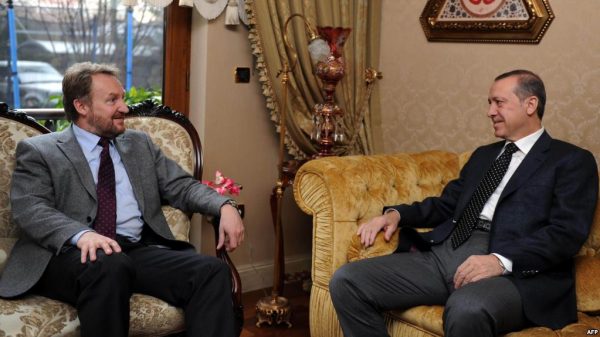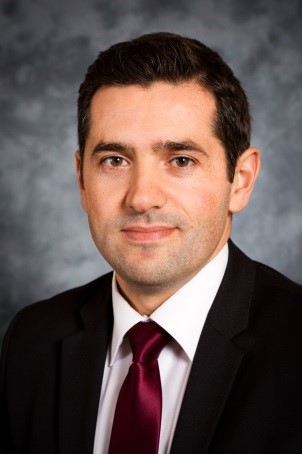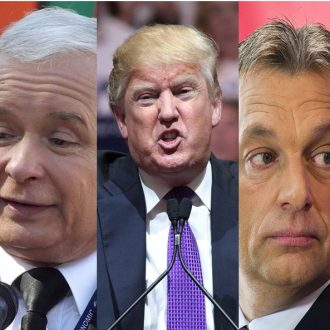Following Trump election in the US last November, Place to B has decided to launch a new project called “Inside Out“. Often times when actors are interior to events, both accuracy and perspective are compromised by being too close to the action; and sadly, often the inverse also holds as well. With Inside Out, we will exit single issue focused, objective, reductive reporting and try together to create a new type of journalistic narrative that takes us beyond the binary. So – perhaps this double Inside Out, Outside In approach would be something you would like to explore with us, to create a journalistic voicing that rises above the deafening solo barrage from our current polarized liberal vs conservative reporting. We hope this interests you and you will help us to create a space for a renewed narrative; and a different, and perhaps more accurate, story.
Inside Out is edited by Sami Cheikh Moussa and Joe Ross.
Find below the next article by Medlir Mema, academic researcher, commentator and political activist.
MAGA! Make Albania Great Again! No, that is not a typo. It is only the latest iteration of the new Trumpian reality making its way around the world, in this case making a splash during the latest parliamentary elections in Albania, where I have been living for the better part of the last 6 years. Although to be fair to Mr. Trump, I doubt he had anything to do with it. Chalk this up as yet another win for the endless, irreversible march toward globalization, where politics are no longer local, at least not in the way they are packaged. I suspect that Mr. Trump would be quite put off by the possibility of another country, even one as insignificant in the global market as Albania, being great. Jean-Baptiste Colbert is his patron saint; not David Ricardo. Which brings us to another reason for not holding Mr. Trump wholly responsible for the current state of affairs. In a truly Trumpian reality, it is likely that the march toward globalization would screech to a halt, making MAGA’s (mis)appropriation a less likely event. Which would you pick?

On sale on Amazon.com
The fact is that MAGA! is not a uniquely Albanian phenomenon. True, the alphabet soup of political campaign slogans may yield different permutations, but the message is the same. If we must be free, great, prosperous, relevant again, we must go it alone. That is after all the message that has been echoing, with varying intensity, on the main streets of the US and the piazzas of Europe. I say main streets, but the coherent and coordinated nature of these demands points partially to a manufactured argument serving the needs of a political class rather than those of a genuine grassroots movement. The implication of this observation is not that we dismiss out of hand these demands, but that we are more creative about how we address the need for greater freedoms and the desire for living in societies that are responsive to their citizens. In other words, we must uncouple the demands for so-called ‘greatness’ from ‘isolationism’.
This ‘go it alone’ mentality is not limited to one side of the political spectrum or the other, and it can be found in heaps just as much on the left as it is on the right. Polarization—both political and social—is by now a well-established feature of the modern societies, but not only. And yet, when it comes to recommending cures for what ails our societies today, that polarization has mindlessly yielded to a set of sterile and uninspiring political ideas and ideals that lead to disenchantment and disengagement for the most part of the electorate and/or to an all-out revolt against the ‘establishment’. Ironically, while many have been at pains to point out the stark contrasts between the US president Donald Trump and his French counterpart Emmanuel Macron, both are products of the same ‘zeitgeist’ and therefore are driven by similar forces in pursuit of ‘greatness’, be it political, social, or economic. Mr. Macron’s recent visit in North Africa caught many observers and EU officials by surprise, in large part because it was perceived that Mr. Macron was ‘going it alone’ in pursuit of the best outcome for France. If the European Union member states stand to benefit from the agreement, even the better, but there should be no mistaking Mr. Macron’s allegiance. Emboldened by a broad presidential and parliamentary mandate, it is likely that we will continue to see an assertive Mr. Macron both domestically and internationally. After all, ‘mission civilisatrice’ shares more than just a passing resemblance with its American counterpart.

© Fadel Senna, AFP | Moroccan King Mohammed VI welcomes French President Emmanuel Macron at the airport in Rabat on June 14, 2017.
The situation is even more dire in countries where republicanism and democratic practices and urges are less well-established or on the brink of collapse. The retrenchment of the Western world and the palliative of populism, both fully embodied, but not originating, in Mr. Trump’s rhetoric and actions, can have potentially destructive long-term effects in the continuing democratization of Central and Eastern European countries, among others. In the case of Albania for example, with West European countries distracted and more concerned with the demands of the local populations for more economic and physical security, the presentation of real governing alternatives has been replaced by the spectacle of parading European politicians and bureaucrats in support of the government or opposition, with the Westerners more concerned about ending drug and human trafficking from Albania into Europe than with the state of Albanian democracy.
Moreover, shorn of ideas or ideology, Albanian politicians, much like their counterparts across the Balkans, and Central and Eastern Europe, spend much of the time debating and conspiring about the alleged influence of certain foreign citizens and the civil society organizations they sponsor. The strategy has certainly worked for Turkey’s Recep Tayyip Erdogan and others seem all too eager to imitate hoping for similar outcomes. With the prospects for EU membership appearing distant due to Western retrenchment, many countries in the region, Albania included, may find EU inducements for meaningful democratic reforms less persuasive. A crescent of instability across the Balkans is not in the interest of anyone, not least the rest of the European countries concerned about increased immigrant populations and perceived heightened insecurity.

Turkish Prime Minister Recep Tayyip Erdogan (right) holds talks with the Muslim member of Bosnia’s tripartite presidency, Bakir Izetbegovic in Istanbul. (Radio Free Europe)
Mr. Trump’s election and his ‘America First’ speech has inspired not only real attempts at imitation, but also a series of viral videos, in each the narrator lauds the merits of his or her country, and in the end asks whether Mr. Trump would agree to their country being second. Joking aside, the videos raise important questions. In today’s political, social, and economic environment, what exactly does it mean to put one’s country first, and more importantly, how does one go about doing so? The answer is less obvious than may appear, especially when one considers that for many the very concept of the state as a means of organizing and providing solutions for the big questions of the 21st century —demographic shifts, technological innovation and the future of the workplace, and environmental pressures— may be an anachronistic one. To get there, we must begin considering the necessity of retooling for the new century and to dare to reimagine a new future. Political Luddites need not apply!
 From the Netherlands to Albania, who will be second?
From the Netherlands to Albania, who will be second?



